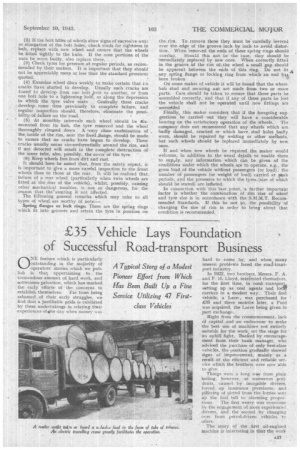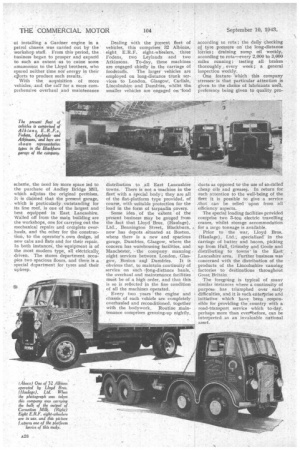E35 Vehicle Lays Foundation of Successful Road-transport Business
Page 29

Page 30

If you've noticed an error in this article please click here to report it so we can fix it.
A Typical Story of a Modest Pioneer Effort from Which Has Been Built Up a Fine Service Utilizing 47 First
class Vehicles'
NE feature which is particularly outstanding in the majority of operators' stories which we publish is that appertaining to the tremendous amount of hard work, and sometimes privation, which has marked the early efforts of the concerns to establish themselves. Far from being ashamed of their early struggles, we find that a justifiable pride is exhibited by these undertakings in relating their experiences of &le day when money was
hard to come .by, and when many unseen problems faced the road-transport industry.
In 1922, two brothers, Messrs. F. A. and F. H. Lloyd, intefested themselves, for the first time, in road transporl setting up as coal agents and locM carriers in a modest way. Their first Vehicle, a Lacrt, was purchased for and three months later, a Ford was acquired; the Lacre being given in part exchange.
Right from the commencement, lack of capital and an endeavour to make -the best Use of machines not entirely suitable for the work, set the stage for • an uphill fight. Backed by encouragement front their bank manager, who advised the purchase of only first-class vehicles, the position gradually showed signs of improvement, mainly as result of the efficient and reliable service which the brothers were now able to give.
Things were a' long wawit from plea' bailing, however, as numerous acci.• dents, caused by incapable drivers, forced up insurance premiums; and pilfering of lietrol from the lorries sent up the fuel bill to alarming proportions. The first worry was overcome by the engagement of more experienced drivers, and the second by changing over from petrol-driven vehicles to oilers.
The story of the first oil-engined machine is interesting in that' the work of installing a Gardner engine in a petrol chassis was carried out by the workshop staff. From this period, the . business began to prosper and expand to such an extent -as to cabse some amazement to the Lloyd brothers, who spared neither time nor energy in their efforts to produce such results.
• With the acquisition of more vehicles, and the call' for a more comprehensive overhaul and maintenance scheme, the need for more space led to the purchase of Audley Bridge Mill, which adjoins the original preMises. It is claimed that the present garage, which is particularly outstanding for its fine roof, is one of the largest and best equipped in East Lancashire. Walled off from the main building are the workshops, one for carrying out the mechanical repairs and complete over
_ hauls, and the other for the construction, to the operator's own design, of new cabs and flats and for their repair. In both instanceS, the equipment is of the most modern type, all electrically, driven. The stores department occupies two spacious floors, and there is a special department for tyres and their upkeep.
Dealing With the present fleet of vehicles,. this comprises 22 All:dons, eight E.R.F. eight-wheelers, three Fodens, tWQ Leylands and two Atkinsons. To-day, these machines are engaged chiefly in the carriage of
foodstuffs. The larger vehicles are employed on long-distance trunk services to London, GlasgoW, Carlisle, Lincolnshire and Dumfries, whilst the smaller vehicles are engaged on -food
distribution to all East Lancashire towns. There is not a -machine in the fleet' with a special body ; they are all of the flat-platform type provided, of course, with suitable protection for the load in the form of tarpaulin covers.
Some idea of the extent of the present business May be gauged from the fact that Lloyd Bros. (Haulage), Ltd., Bennington Street, Blackburn, now has depots -situated at Boston, where there is a new and spacious garage, Dumfries, Glasgow, where the concern has warehousing facilities, and Manchester, the company manning night services between London, Glasgow, Boston an Dumfries. It is obvious that, to maintain continuity of service on such long-distance hauls, • the overhaul and maintenance facilities muSt be of a high order, and that this is so is reflected in the fine condition of all the machines operated.
, Every two years the engine and chassis of each vehicle are completely overhauled and reconditioned, together with the bodywork. Routine Maintenance comprises greasing-up nightly,
according to rots; the daily -checking of tyre pressure on' the long-distance lorries ; draining sump oil weekly, according to rota—every 2,000 -to 3,000 miles running; testing all brakes thoroughly , every week; a general inspection weekly.
One feature which this company stresses' is that particular attention is given to the choice of lubricants used, preference being given to quality pro
ducts as opposed tothe use of so-called' cheap oils and greases. In return for Such attention to the well-being of the fleet it is possible tci give a service that can be relied upon from all efficiency aspects.
The special loading facilities provided comprise two 2-ton electric travelling cranes, whilst storage .accornmodatiOn for a large tonnage is available, Prior to the war, Lloyd Bros. (Haulage), Ltd.; specialized in the Carriage of butter and bacon-, picking up from Hull, Grimsby and Goole and distributing to towns. in the East' Lancashire area. Further business was concerned with the distribution of the products of the Lincolnshire tanning factories to 'destinations throughout Great Britain.
-The • foregoing is typical of many similar instances where a continuity of purpose has triumphed over early difficulties, and it is such enterprise and initiative which have been responsible for providing the 'country with a road-transport service which to-day, perhaps more than evergbefore,. can be interpreted as an invaluable national a sset




















































